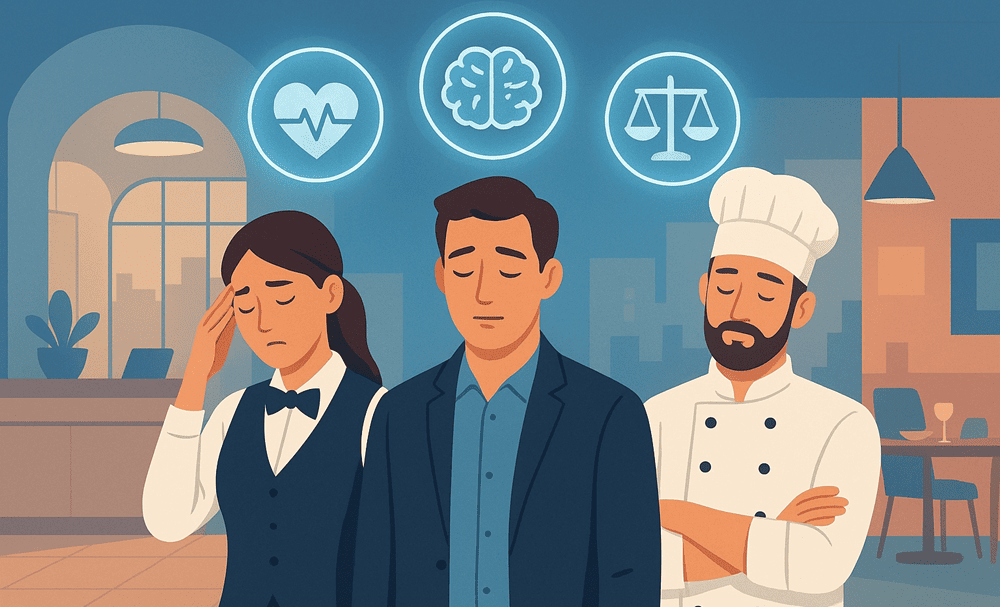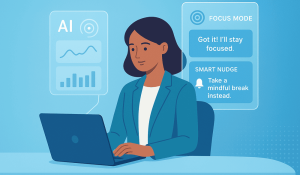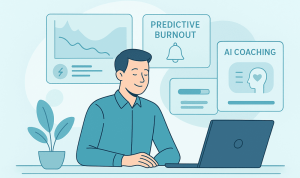Running hotels and restaurants means more than offering good food, clean rooms, or smooth service. Behind the polished smiles and attentive hospitality lies a workforce that often carries heavy emotional and physical strain. In today’s climate, hospitality staff wellbeing is no longer just a talking point, it is a business priority.
High turnover rates, labor shortages, and customer expectations are adding new pressures every season. Whether it is a server managing three tables at once or a hotel front-desk associate juggling check-ins, complaints, and phone calls, stress is part of daily life. But that stress can be managed with the right mix of culture, tools, and smarter systems like AI for hotels and AI hospitality coaching.
Why Hospitality Staff Wellbeing Matters
Hospitality is built on people. When staff feel supported and valued, guests feel it too. Yet the industry consistently shows some of the highest rates of burnout. Studies reveal that more than 50 percent of restaurant employees consider leaving their jobs due to stress and fatigue, while hotel staff often work irregular schedules that disrupt sleep and family life.
Key reasons wellbeing matters:
- Better retention in a high-turnover industry
- More consistent service quality for guests
- Reduced absenteeism and sick leave
- Healthier workplace culture that attracts talent
In short, a workforce that feels balanced and resilient is the foundation of a thriving hospitality brand.
The Stress Reality in Hotels and Restaurants
Let’s look closer at what employees face daily:
- Constant guest interaction: Serving food, checking in guests, or handling complaints demands patience, even under fatigue.
- Long hours: Double shifts and late nights are common in restaurants and hotels.
- Unpredictable workload: Slow mornings can suddenly turn into chaotic evenings.
- Emotional labor: Staff must smile and remain calm even when personally stressed.
- Physical demands: Carrying trays, cleaning rooms, and standing for hours strain the body.
This cocktail of challenges creates a breeding ground for restaurant worker burnout and rising stress levels among hotel employees.
How AI is Changing Staff Support
The introduction of AI for hotels and customer service stress AI is bringing a practical layer of support. AI-driven systems can:
- Track workload patterns and suggest better scheduling
- Monitor signs of exhaustion based on working hours and interactions
- Provide personalized nudges for breaks or stress-relief exercises
- Offer conversational support tools that act as a “coach” during tough shifts
Hotel stress reduction no longer has to rely only on management practices. With AI hospitality coaching, frontline staff gain real-time guidance, while managers receive insights into overall team wellbeing trends.
Everyday Stress Management Practices
Technology plays a role, but wellbeing starts with culture and simple practices. Here are proven approaches:
- Micro-breaks matter – Encourage staff to pause for a few minutes between tasks to hydrate, stretch, or simply breathe.
- Rotating tasks – Avoid burnout by switching roles during long shifts, such as alternating between front desk and administrative tasks.
- Clear communication – Set realistic expectations with staff so they are not blindsided by last-minute changes.
- Employee feedback loops – Listen actively to staff input and implement changes when possible.
- Training in emotional resilience – Teach techniques to handle customer stress without internalizing it.
Example Scenario
Imagine Maria, a hotel receptionist working back-to-back shifts during peak season. An AI hospitality coaching tool tracks her unusually high number of guest interactions, flags potential stress, and prompts a micro-break.
Maria takes five minutes away from the desk to stretch and reset. Small interventions like this prevent stress from accumulating into fatigue or burnout.
Common Stressors and Solutions
| Stress Factor | AI-Based Support | Human Practice |
| Long shifts | Smart scheduling with AI to balance workload | Split shifts, rest breaks |
| Guest complaints | Sentiment analysis to flag rising stress | Peer support, debrief with team |
| Physical strain | Nudges for hydration and posture correction | Ergonomic tools, task rotation |
| Emotional load | Chatbot wellness coach for real-time guidance | Mental health workshops |
Lessons from Other High-Stress Industries
Hospitality can learn from industries already adopting wellness technology:
- AI for burnout forecasting in logistics predicts stress peaks before they occur.
- AI mental health support for construction workers shows how heavy-duty jobs integrate wellbeing tools without slowing operations.
- Industrial wellness AI has taught us how physical industries balance human fatigue with machine intelligence.
By adapting these approaches, hotels and restaurants can create effective, tech-powered wellbeing systems.
Building a Culture of Wellbeing
Hospitality leaders must also invest in long-term cultural changes. Some strategies include:
- Introducing employee wellbeing solutions tailored to hospitality needs.
- Encouraging mindfulness of construction worker practices, such as breathing techniques, adapted for fast-paced service environments.
- Offering personalized wellness programs where staff can choose the activities that fit them, whether yoga, counseling, or digital wellbeing apps.
- Centralizing resources into a workplace wellness platform that staff can access anytime, even outside shifts.
When leadership models these behaviors and invests in wellbeing tools, employees feel more empowered to care for themselves.
Why Now is the Time to Act
Guest expectations are higher than ever, and staff shortages mean existing workers often take on extra responsibility. Ignoring hospitality staff wellbeing creates higher turnover, which only adds to operational costs.
Investing in tools like customer service stress AI or AI for hotels is not about replacing managers, it is about providing staff with relief and showing them they matter. In return, businesses enjoy better retention, improved guest experiences, and a healthier bottom line.
Final Thoughts
Hotels and restaurants are powered by people who often put their own wellbeing second to guest satisfaction. Supporting them through AI hospitality coaching, smart scheduling, and cultural initiatives ensures their energy and motivation remain intact. Addressing restaurant worker burnout and reducing stress in hotels is not only an ethical responsibility, it is a competitive advantage.
A future-focused approach to hospitality staff wellbeing combines empathy with technology. When businesses care for their people, their people care better for their guests and that is the essence of true hospitality.







